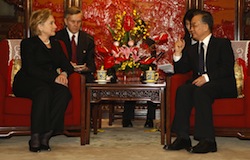Clinton Says Sanctions on Iran Closer
February 25, 2010
Featured Image
We are happy to serve you a daily summary of the day's top nuclear policy stories each morning, with excerpts from the stories in bullet form.
Stories we're following today:
Clinton Cites Progress in Iran Sanctions Effort - Associated Press [link]
- Secretary of State Hillary Rodham Clinton said Wednesday that U.S. diplomacy has moved China closer to the American view that Iran's continuing refusal to come clean on its nuclear program demands tough new U.N. sanctions.
- "Our very clear commitment to engagement has created space for a lot of these countries to now consider supporting sanctions that they might not have otherwise, because we have demonstrated the strategic patience to exhaust the international efforts of convincing Iran to do the right thing without sanctions," she said.
- Clinton addressed the possibility that Congress may impose its own sanctions on Iran, besides those the U.S. is seeking through the United Nations Security Council.
- Congressional sanctions might be tougher than any the United States could win international approval for at the U.N., but the United States wants international backing for its tough stance against Iran and sees the U.N. penalties as a powerful symbol of world resolve against an Iranian bomb.
Iranian Threat to Destroy Israel Doesn't Hold Up - Hareetz [link]
- [Any Iranian attempt to destroy Israel with a nuclear bomb] would surely lead to the destruction of Iran itself by Israel and the United States. Therefore, the idiotic claim that Iran could bring about Israel's destruction does not hold water.
- While it is true that Ahmadinejad would love Israel to implode of its own accord, a self-confident and strong nation should not take such statements too seriously. And it certainly should not view them as an existential threat.
- It is a great pity that through our own [Israeli] conduct, and especially the irresponsibly alarmist voices emerging from among us, we have inflated a political problem into an existential threat. And it is an equally great pity that we have granted legitimacy to nuclear bombs being viewed as weapons, instead of helping to delegitimize this useless weapon.
Obama's Nuclear Moment - Foreign Policy [link]
- President Barack Obama has a chance to make real headway in finally ending the Cold War arms race. So far, his rhetoric has been lofty, but actions few. In the next few months his promises and speeches will be tested by a series of key events and decisions.
- The status quo is not good enough. In the years since the Soviet collapse, we've been wandering in a Cold War fog, a mindset that someday we might need all those nuclear warheads, so let's keep them. The temptation is always to leave things as they are, or make only small changes on the margins.
- But the fact is that the United States and Russia are saddled with thousands of warheads that have little practical use in the modern world. Today's real threats are more diffuse, more regional, and more asymmetrical than during the Cold War.
- In a letter to Obama Feb. 1, a group of prominent experts and former government officials sensibly urged the president to seek "transformational rather than incremental changes" in several key areas.
U.S. Envoy Says Seeking Fresh Momentum on North Korea - Reuters [link]
- Speaking in Beijing on Wednesday, the U.S. Special Representative for North Korea, Stephen Bosworth, said his talks with Chinese counterpart Wu Dawei had addressed how to "try to regain momentum and get back to the negotiating table."
- "I think everybody shares the view that it is important to get back to the negotiating table as soon as possible," he told reporters at a short news briefing, but added it would be premature to disclose how negotiations could be boosted.
- The North has said it could end its nuclear arms program if the United States drops what Pyongyang calls a "hostile policy," and it has also demanded that Washington agree to peace treaty talks and lift sanctions.
- Washington has said North Korea's demands for aid and improved relations can be addressed only along with renewed nuclear disarmament steps by Pyongyang.
The Obama Disarmament Paradox: A Rebuttal - Bulletin of the Atomic Scientists [link]
- Greg Mello's recent Bulletin article "The Obama Disarmament Paradox" distorts the Obama administration's nuclear agenda by making unjustified assumptions that discredit President Barack Obama's historic commitment to seek a nuclear-weapon-free world.
- Mello sees Obama's requested increase in the fiscal year 2011 budget for stockpile stewardship and the construction of new facilities at the nuclear laboratories as a commitment to the production of new nuclear weapons. Yet the administration has made clear that there are no such plans underfoot; the 2011 budget request states unequivocally that "new weapons systems will not be built."
- Mello also seems to forget that the pursuit of a nuclear-weapon-free world is both national and international law; the NPT, which the United States has ratified, includes a commitment to seek nuclear disarmament.
- While it is legitimate to be skeptical about how successful Obama will be in implementing his disarmament agenda, let's hope Mello and others will wait to see how the follow-through progresses before they judge him too harshly. Anything else would be unfair.



